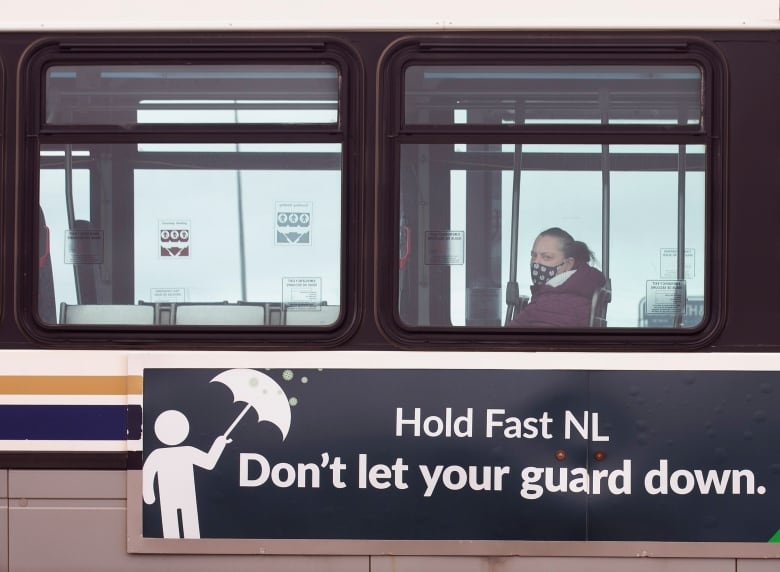Who was that masked mandate? N.L. is about to turn a COVID corner, but with risks
Many people say they will still wear masks in indoor places like stores

When Newfoundland and Labrador's mask mandate comes off on Tuesday, will all the masks come off, too?
From what I gather through everyday conversations and social media chatter not necessarily. Indeed, it seems many people will be keeping their masks on in indoor public spaces, at least for the time being.
This is a pandemic milestone that's been long anticipated, but there's still a feeling of anxiety out there, thanks largely to the virus itself and its ever-changing, ever-nastier variants.
According to Dr. Peter Lin, the Toronto general practitioner who does a regular health column for CBC Radio's morning shows, it's just human nature that people and politicians want to bring an end to mask mandates.
"Everybody wants to get rid of masks. I want to get rid of it because no mask means that we've won against the virus and that we're back to normal," Lin said in a conversation this week with Ramraajh Sharvendiran of The St. John's Morning Show.
"So that's why a lot of governments have made it their goal to get rid of the mask, so when they hit this percentage of people vaccinated, then you can take masks off."
Speaking at Friday's COVID-19 briefing, Fitzgerald said she still expects to see many people voluntarily wear masks after Tuesday's change comes into effect. (It does not apply to hospitals and seniors' homes.) So why change the mandate at all? Fitzgerald said the legal weight of the order needed to be reconsidered.
"I anticipate that people will continue to use the masks. We recommend that people do. It's just the question of whether it meets that legal test of requirement," Fitzgerald said.
The variable that's changing the game board at the moment is the so-called delta variant (less of a mouthful than its more formal name, B.1.617.2). The delta variant not only replicates faster in the body, but is wildly easier to move from person to person.
How much so?
"The delta variant increases the viral load by about one-thousand-fold, making it much easier to catch and transmit," said Prof. Sarah Otto of the University of British Columbia.
B.C. is one of the areas that relaxed measures (it dropped the mask mandate for many indoor spaces in early July) only to see rates start rising sharply.
'Now people are angry'
For many researchers, these are not coincidental; we've seen changes in rules around the world about mask mandates, and the confusion that comes with that.
"We can look at what happened in Israel and the United States. They got rid of the masks and the cases zoomed back up and now they have to put back the mask," Lin said.

"Now people are angry because it seems like we're going backwards because you have to put back the mask."
Personally, Lin is in favour of sticking with a mask mandate for the longer haul, rather than an approach that may mean going back and forth. "It's much easier to keep the mask on instead of getting rid of it and then having to come back a couple of weeks later and say, 'Look, you've got to put it back on again,'" he said.
"Let's just consider it like a seatbelt. You know, we get into the car, we put on our seatbelt. We don't even think about it for now. Let's think about mask in that way in the context of whether you're vaccinated or not. Let's keep that mask on."
Vaccination rates have been high
What's helped Chief Medical Officer of Health Dr. Janice Fitzgerald get to this point are vaccination rates that are the envy of others in Canadian public health. Newfoundland and Labrador has been leading the country for takeup of approved vaccines, at least for the first dose. We actually have some ground to make up for the second.
As of Friday,just over 84 per centof eligible people had the first dose, and just over 60per cent had their second.

The sense of anxiety you can feel in the air, though, is about the spread of the virus in other jurisdictions, and how the virus can travel. As international travel looms, it's worth noting that our fully vaccinated rate is higher than all but eight U.S. states.
While the race is on now to reach more people with vaccines walk-in clinics opened Friday at the Village Shopping Centre in St. John's, where a former clothing store has been a public health hub for much of this year decisions on masking will come to the individual.
My colleague Bernice Hillier, co-host of Newfoundland Morning, asked people on Twitter earlier this week what they will do. Among the dozens of responses, most said they'll be wearing masks indoors. Others said they're comfortable following Fitzgerald's guidance.
Still others said they'll be waiting to see how things evolve.
And, of course, there was concern about what impact a fast-moving delta variant (or another) might have on young children, or people who have compromised immunity.
My own thoughts were on that when I came across a startling visualization of the impact of vaccination. U.S. radiologist Dr. Pradheep Shanker tweeted the chart below, which shows how vaccines have provided stunning protection among vaccinated people against death from COVID-19.
If this doesn't get you to vaccinate... Nothing will. pic.twitter.com/skaAoANOuV
—@NeoavataraI'll return to a comment from Peter Lin that stood out, too, about how masks are just one part of the toolbox we've developed to protect ourselves. Lin does not share the view that a level of vaccination is an automatic green light for removing masks.
"That would be like me saying, you know, once we get airbags in everybody's car, you can get rid of your seatbelts," he said. "We don't do that because the purpose of the airbag is not to get rid of the seatbelt. It's to make it safer for you."















_(720p).jpg)


 OFFICIAL HD MUSIC VIDEO.jpg)
.jpg)



























































































